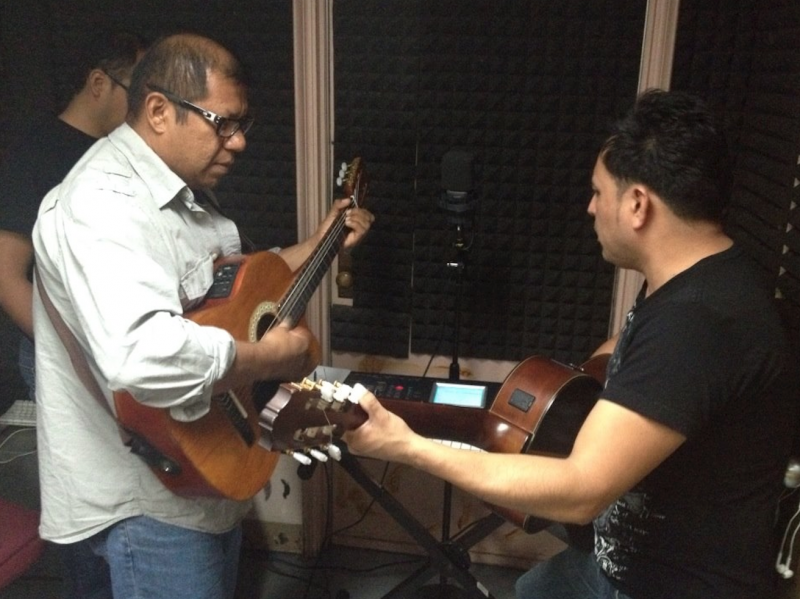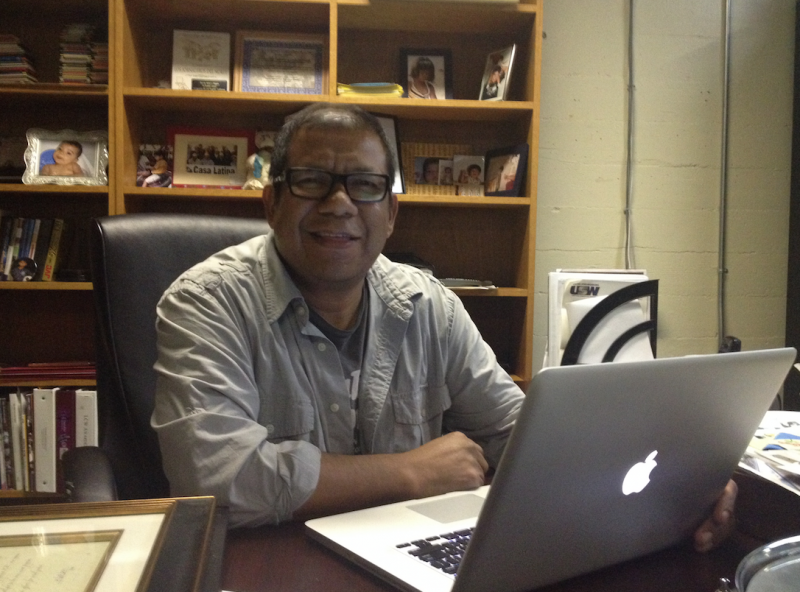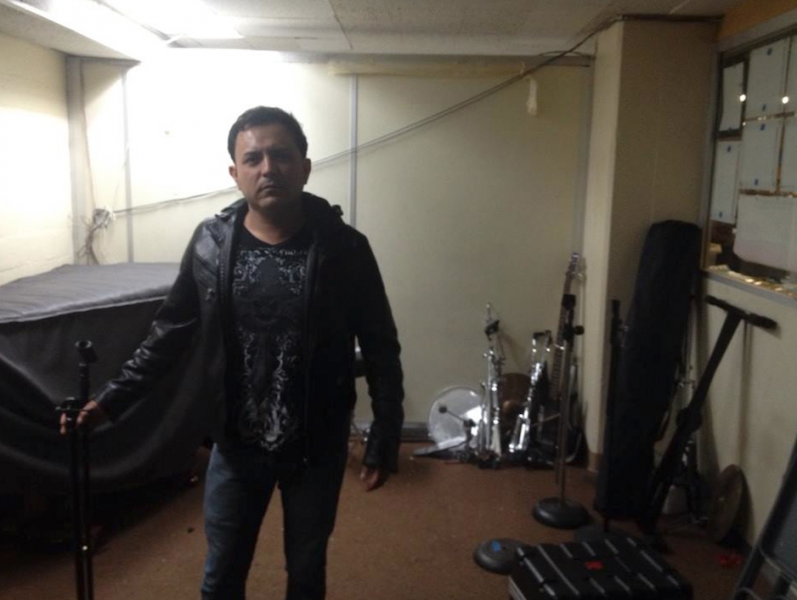Meet Los Jornaleros Del Norte, A Band Empowering Migrant Workers

In the basement of UCLA's Downtown Labor Center, 38-year-old Omar León plays the accordion and sings of the challenges faced by migrant workers in the United States. He is rehearsing a song for Los Jornaleros del Norte (Laborers of the North), a day laborer band associated with the National Day Laborer Organizing Network (NDLON).
León, lead vocalist of the band, sings “Serenata a un Indocumentado," a serenade to an undocumented immigrant from his position as a legal citizen of the U.S. Yet not long ago, he was struggling to gain legal residency himself.
León remembers when he illegally crossed the Mexican-American border at 12-years-old, riding in a van full of strangers and his brother’s ex-wife. Lying on the bottom of the car floor underneath other passengers, León felt it was the longest ride of his life.
“So many people were on top of me and I couldn’t feel my body or breathe,” León said. “I thought I was going to die. I don’t even pray much, but I was saying ‘God, please, please let me get there safe.’”
After arriving in San Diego, León then moved into a house where he waited for family members to pick him up. His parents had left from Mexico shortly before he did to Santa Maria, Calif. to find jobs as field workers.
León grew up in Santa Maria, and said he spent most of his childhood not realizing he was an undocumented immigrant.
“My family never really talked about it,” he said. “I was little, so all I knew was I was in a new place and had to learn English as a new language.”
It was not until León was in high school that he had an experience that made him realize his status. He and his family were playing soccer in a park in their neighborhood when suddenly everyone began frantically running in different directions.
“We thought a fight was going on between the soccer players or something because everyone was yelling, ‘Run!’” León said. “My dad and uncle grabbed me and threw me in the car and told me to hide as we sped away. They said it was an immigration police raid.”
At this point, León said he became aware of the lacking freedoms he had as an undocumented immigrant. He and his family had to live in fear of deportation by ICE, U.S. Immigration and Customs Enforcement.
León’s parents, both field workers, received some relief in 1986 when they became beneficiaries of President Reagan’s Immigration Reform and Control Act of 1986, which granted citizenship to those working in seasonal agricultural jobs. They later helped León become a citizen in 1993 when he turned 17-years-old.
“It felt so nice to become a legal resident,” León said. “I was able to pull out an ID card comfortably for the first time, travel back and forth to different parts of the country, and see my family in Mexico.”
Even as a documented citizen, however, León said he still faced challenges getting work and making money to support himself. He moved to Los Angeles at 17 and began working in the fields like his parents did. Nine years later, he became a day laborer, searching for work at the Hollywood Community Job Center, one of four day laborer community job centers operated by Instituto de Educación Popular del Sur de California (IDEPSCA), which helps provide day jobs for workers so they do not have to solicit employment on street corners under the risk of exploitation and unsafe working conditions.
Working his way up to the position of a day laborer organizer, León said he was thankful of the rights he had as a documented citizen. “Having documents, you are so privileged compared to other people who don’t. You don’t have to worry about simple things like going out to work and not knowing if you’ll be able to come back home and have dinner with your family at night.”

Wanting to see other undocumented immigrants experience the same benefits he did, León became an activist for immigrant rights. At IDEPSCA, León met executive director and co-founder Pablo Alvarado of NDLON. Alvarado is an immigrant from El Salvador who had worked as a day laborer for six years himself. He recruited León to translate his activism into music with Los Jornaleros.
Because he wasn't a professional musician, León said he was hesitant to join the band at first. Alvarado, a trained guitar and bass player for the band, assured León that Los Jornaleros’ goal was not to play professionally, but to contribute to the movement of immigration reform.
Musical Protest
“There are times when you have to protest in the streets with signs or participate in acts of civil disobedience to get a point across,” León said. “But there are also times when you have to pull out your accordion and sing to get people to listen to your message.”
At times, Alvarado said a song can serve as the best kind of protest. It was with this idea in mind that Alvarado and another former day laborer Omar Sierra started Los Jornaleros in 1996. Sierra was looking for work in a Kmart parking lot in the city of Industry when he saw a county mobile health clinic with a mariachi band, offering free food and HIV tests. As he got in line to get his blood drawn, federal immigration police raided the lot, and he fled the area along with other day laborers.
Alvarado, then an organizer with the Coalition for Humane Immigrant Rights in Los Angeles (CHIRLA), called a meeting to address the day laborers who were at the raid. At that meeting, he met Sierra, who had written a song about the raid called “El Corrido de Industry” or “The Ballad of Industry." He performed the song with a guitar he found out of the trashcan, singing the lyrics: “The doctors were shocked/ to see the people running/ one friend of mine/ has never known fear/ but they had him tight/ by the hands and throat… we don’t understand the motive/ nor the reason for there to be so much discrimination against us/ if we are all ultimately equal when we are in the grave." As he listened, Alvarado said it made sense to protest with music.
“It just clicked for everybody who was there,” Alvarado said. “They were like, ‘Wow, that’s exactly what happened and how we felt.’”

The band plays most of their gigs for free, and León said the group’s passion for the issue of immigration reform is what keeps them going.
“We have a message and that is what has kept us together even when we face challenges like financial issues,” said León, who currently also serves as a program coordinator at NDLON. “We don’t make profit from the music, so we’ve struggled to keep the group together, but we’ve also pushed to make sure we stay a band.”
Since the band members are from different countries including Mexico, El Salvador and Guatemala, they perform songs in a range of musical styles such as cumbia, ballads and rancheras. They sing at a variety of events including rallies for immigration reform and for the rights of day laborers, car wash workers, truck drivers and fast food workers.
Singing About Today's Issues
Most recently, Los Jornaleros performed on Dec. 2 at Los Angeles City Hall during the Fight for $15, a protest for higher wages for fast food workers. Although most of their music is in Spanish, many of the fast food workers at the protest were non-Spanish speakers. As a result, León noted the band is hoping to begin singing songs in English as well. Still, he said the music appeals to both Spanish and non-Spanish speakers who are affected by or sympathize with the issue of immigration reform and migrant worker’s rights.
“Everyone loves music so we can sometimes get the attention of people when we perform songs with a rhythm they can dance to,” León said. “Then, eventually, they might start listening to the lyrics and it can raise consciousness of things that are happening in our community and attract allies.”
This use of music as a means of heightening public awareness of social justice issues is not an infrequent practice. Professor Shana Redmond of American studies and ethnicity at the University of Southern California researches the ways in which music and popular culture factor in developing social movements.
“The role of music in social justice movements has been tremendous and figures as a pivotal method of organization and political speech throughout the 20th century and its turn to the 21st,” Redmond said.
As examples, she referred to the band's six-week long series of performances outside L.A.’s Metropolitan Detention Center, a federal lockup where detainees caught by ICE are sent to await trial. They named this campaign and concert series, which protested the Obama administration’s aggressive deportation policies and lack of action on immigration reform, “Chant Down the Walls."
Here's a clip of Los Jornaleros singing to detainees in the L.A. Immigration Detention Center.
“As a major issue for our day, immigration justice has developed its own songs to mobilize people and bring critical consciousness,” Redmond said. “The work of [Los Jornaleros] at the detention center, for example, is an auspicious effort to bring attention and resources to this embattled community and carries on in a long tradition of music-making as a strategy for progressive change.”
It was at one of the “Chant Down the Walls” events that León said he was inspired to write the song “Serenata de Indocumentado."
He was walking outside the center when he met a woman who had brought her children to visit her detained husband on his birthday. Although she could not go inside the center, she had flowers and balloons for her husband. From outside, she would tell him she loved him using signs. After speaking to her, León wrote the lyrics “look out the window/ I brought you a serenade/although you are imprisoned/ the one who loves you is singing/ I gamble my life for you/ to liberate you I’d de at the front/ such unjust laws/ that seek to separate us…Wherever you go I would follow you/ even if they deport you/ to hell with this north/ what’s the point without you?”
Later performing this song outside the detention center and dedicating it to all of the detainees, Alvarado saw a positive response.
“[The detainees] were flickering the lights in their cells to show they heard us, taking turns to come out the balcony to listen to us and putting their case numbers to the windows so we could read about their cases,” Alvarado said. “Some people said to us, ‘Well, these are criminals!’ and we say, ‘It doesn’t matter, they’re humans. Some of them might have been in the wrong place at the wrong time.’”
As word of the campaign spread, Alvarado said increasingly larger crowds began coming out to watch Los Jornaleros perform.
“All of a sudden, even families of the detainees were coming out to watch us,” he said. “Four children once came up to us, thanked us and said, ‘My dad is here and that’s why we are here!’”
Drawing Attention to Social Issues Through Music
For Los Jornaleros, it is events like “Chant Down the Walls” that show how music can be a humanizing, connective force. “Because music is universal, it can touch the hearts of so many people,” Alvarado added. “When you recover an oppressive experience through arranged lyrics and then you bring it back to the people, that experience becomes everyone’s experience. It’s hard to explain… It’s just magical.”
In his book "Questions of Cultural Identity," sociomusicologist and former music critic Simon Frith explains that the experience of music can be one of collective identity. In other words, in responding to a song, we are drawn into emotional alliances with performers and with the performers’ other fans. Frith writes that we absorb the songs into our own lives and rhythm in our own bodies in part because they have a looseness of reference that makes them immediately accessible.
Although Los Jornaleros' songs are readily available to the public online, León said the band has difficulty with gaining a wide listenership to publicize its message. The group has benefited from publicity from collaborations with more widely known musicians, such as Chilean rapper Ana Tijoux and Spanish/French singer Manu Chao.
Here is Ana Tijoux at "Chant Down the Walls" in October 2014.
“We sing about a lot of things that other people don’t want to mention,” León said. “We want to motivate other musicians with wider followings than ours to sing or work with us because they can reach more people. The songs can be more impactful in that way.”
At the same time, León said the band members remain motivated to share their message with anyone who will listen.
“We will continue doing it even if we are just playing for a few people,” León said. “It is very important for us to try to motivate as many workers as we can to stand up and fight for their rights.”
This is not to say there hasn't been backlash. León said they have received intimidating messages on their Facebook page like “Go back to your country and die in your country!", even protests at their live performances from anti-immigrant groups like Save Our State.
León asserted that the band receives the verbal attacks peacefully. “We’re not going to change the lyrics of our music to make someone comfortable or happy. We are just repeating what we see and hear on the streets,” León said. “The minute we see anti-immigrant protesters, we just play music for them, and after a while, they decide not to come anymore.”
Currently, Los Jornaleros is working on recording new songs following President Obama’s Nov. 20 executive action on immigration, which approved the deferring of the deportation of millions of undocumented immigrants that arrived in the U.S. before 2012 and under the age of 16, or arrived in the US before 2010 and have at least one child who is a U.S. citizen or legal resident.
“I was outside the detention center and many people were crying of happiness but others were crying because they wouldn’t be beneficiaries,” León said. “It was a combination of feelings.”
Moved by this experience, León went home and wrote a song called “Eterno Indocumentado," which translates to “Eternally Undocumented." The acoustic version of the song is up on León’s Facebook and has already been viewed more than 3,000 times. León wrote the video’s description in Spanish: “for those whose work is not recognized in this country… Let’s keep fighting.”
The band is also producing music on issues that go beyond immigration reform and migrant worker’s rights in the United States. They are concerned with universal human rights issues, writing songs about the aftermath of the shooting of Michael Brown in Ferguson and the killing of 43 innocent students in Mexico late last year. "We want to promote immigrant rights, student rights, women rights, human rights,” León said. “It’s something we have to do.”
“The way I see it is that the music is not just part of the fight, but it’s also a celebration,” Alvarado said. “The way you create and recreate music… You’re also creating and recreating the struggle. Then, you’re able to go beyond that point to create an image of what the world can be through the music.”
Reach Staff Reporter Sarah Zahedi here.



